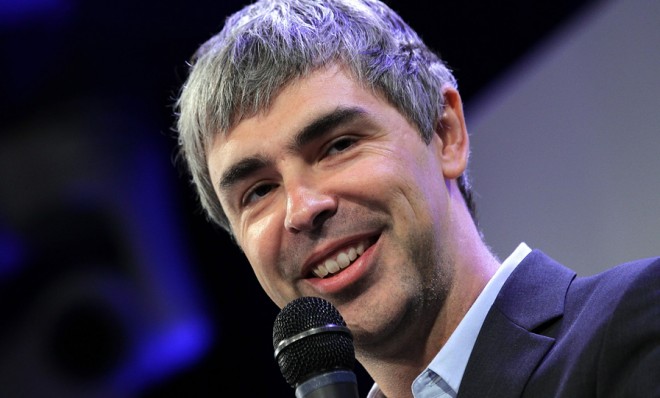Larry Page's vocal cord paralysis: What does it mean for Google?
"Sergey says I'm probably a better CEO because I choose my words more carefully."

A free daily email with the biggest news stories of the day – and the best features from TheWeek.com
You are now subscribed
Your newsletter sign-up was successful
Last June, Google claimed that CEO Larry Page missed the company's annual shareholder meeting because he "lost his voice," sparking a flurry of rumors that he might be suffering from a life-threatening illness. Last night, Page revealed the true source of his health troubles: bilateral vocal cord paralysis, a rare ailment that interrupts the nerve impulses to your voice box and makes public speaking a bit of a nightmare.
In a post on his Google+ profile, Page said he lost his voice 14 years ago during a bad cold, and was later diagnosed with left vocal cord paralysis. Then last summer, after the same pattern repeated itself, a doctor informed him that he now has limited use of both vocal cords.
Bilateral vocal paralysis isn't life threatening, though it certainly sounds uncomfortable. Symptoms include hoarseness, shortness of breath, pain when speaking, lower vocal volume, and persistent coughing from food and water going down the wrong pipe. The condition can be caused by a viral infection — as likely happened in Page's case — or cancer, a neurological disorder, or damage during surgery, according to the Mayo Clinic. It almost never causes total voice loss, a head and neck doctor told the Wall Street Journal.
The Week
Escape your echo chamber. Get the facts behind the news, plus analysis from multiple perspectives.

Sign up for The Week's Free Newsletters
From our morning news briefing to a weekly Good News Newsletter, get the best of The Week delivered directly to your inbox.
From our morning news briefing to a weekly Good News Newsletter, get the best of The Week delivered directly to your inbox.
Though Page has not revealed any plans for corrective surgery, his announcement seems to have cooled some anxiety about his health — Google shares are up 2 percent today. Corporate governance experts tell the Journal that the disclosure is a "responsible gesture to investors," especially after the criticism Apple underwent for sometimes being less than forthright about Steve Jobs' battle with pancreatic cancer.
And the bottom line, for most industry watchers and investors: Will a softer speaking voice and persistent cough impact Page's ability to run a $300 billion company? He doesn't seem to think so. From his Google + post:
Thankfully, after some initial recovery I’m fully able to do all I need to at home and at work, though my voice is softer than before. And giving long monologues is more tedious for me and probably the audience. But overall over the last year there has been some improvement with people telling me they think I sound better. Vocal cord nerve issues can also affect your breathing, so my ability to exercise at peak aerobic capacity is somewhat reduced. That said, my friends still think I have way more stamina than them when we go kitesurfing! And Sergey says I’m probably a better CEO because I choose my words more carefully. So surprisingly, overall I am feeling very lucky.
If Page does want to unparalyze his vocal cords, there are a few treatments that can help reverse the damage. Forbes explains:
In a procedure referred to as "medialization laryngoplasty", the vocal cord is mechanically re-positioned more toward the midline to allow for a so-called stronger "strike" against the opposing vocal cord, thereby producing a louder and stronger voice. [Forbes]
Other types of laryngoplasty include a procedure in which "an implant made of a surgical polymer is placed inside the tracheal wall (as support) to medialize the affected vocal cord," and one that involves "injections of a purified fats, Gelfoam, collagen or alloderm tissues such as Cymetra," says Forbes.
A free daily email with the biggest news stories of the day – and the best features from TheWeek.com
Carmel Lobello is the business editor at TheWeek.com. Previously, she was an editor at DeathandTaxesMag.com.
-
 El Paso airspace closure tied to FAA-Pentagon standoff
El Paso airspace closure tied to FAA-Pentagon standoffSpeed Read The closure in the Texas border city stemmed from disagreements between the Federal Aviation Administration and Pentagon officials over drone-related tests
-
 Political cartoons for February 12
Political cartoons for February 12Cartoons Thursday's political cartoons include a Pam Bondi performance, Ghislaine Maxwell on tour, and ICE detention facilities
-
 Arcadia: Tom Stoppard’s ‘masterpiece’ makes a ‘triumphant’ return
Arcadia: Tom Stoppard’s ‘masterpiece’ makes a ‘triumphant’ returnThe Week Recommends Carrie Cracknell’s revival at the Old Vic ‘grips like a thriller’